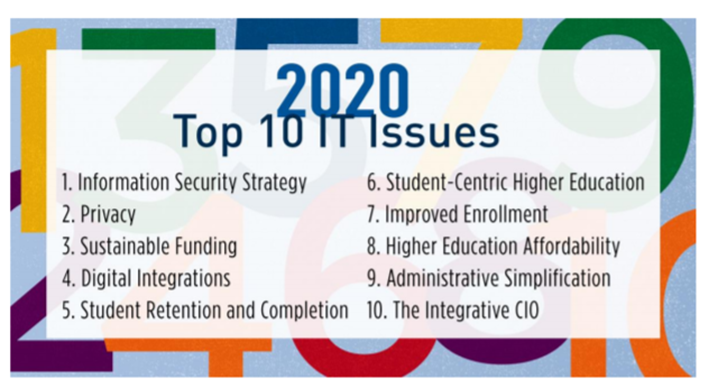 IData was at the Educause conference in October, 2019, where Educause presented its top ten IT priorities for 2020, based on its research and membership survey. For the past several years, data governance-related (or data intelligence-related) priorities were numerous on this list, but for 2020 the list has a slightly new direction. And we thought we would share our thoughts on the subject.
IData was at the Educause conference in October, 2019, where Educause presented its top ten IT priorities for 2020, based on its research and membership survey. For the past several years, data governance-related (or data intelligence-related) priorities were numerous on this list, but for 2020 the list has a slightly new direction. And we thought we would share our thoughts on the subject.
Educause itself groups these ten priorities into three categories: simplification; sustainability; and innovation. Information security and privacy are #1 and #2 on this list, and digital integrations are #4, (and if we dig a little deeper we see a mention of a common data framework as well as using data to support an enrollment strategy), so it's not as if the need for oversight, management, and stewardship of data has disappeared from this list, but its urgency does seem to have diminished.

This accords with our experience at IData, that data governance has moved from being "something we probably should do" to "an institutional priority" for many organizations over the past half-decade. The focus is no longer on making the case for data governance, but on putting it into practice.
In this post we want to focus on the final entry. Called "The Integrative CIO," described as "repositioning or reinforcing the role of the IT leadership as an integral strategic partner of institutional leadership in supporting institutional missions."
At the risk of radically oversimplifying, to our ears this sounds like another way of getting at a key aspect of data management that probably hasn't been given enough attention over the years, and that's organizational data strategy. Now, information technology is of course broader than just data, but IT has a critical role to play in any organization's attempts to use and manage data. And we would argue that data is the most valuable resource that IT helps utilize.
Many of our customers have been trying for years to use their data more strategically, whether as part of a formal analytics initiative, or more manageable efforts such as better understanding and improving student/customer retention, or business process reengineering to increase operating efficiencies. They've encountered a number of obstacles in this effort, some technical, some procedural, many cultural, and all of them have learned that analytics without governed and curated data is hard to act on. If you've read this blog or seen us at a conference, you've heard us talk about this until our faces are blue.
Using data strategically is almost certainly a crucial part of any organization data strategy, but the two are not synonymous. A data strategy asks, "What is the purpose of our data?" and "What do we want to accomplish with it?", among other questions. And the answers to those questions ought to be consistent with an organization's overall strategy.
If part of our organizational strategy includes enrolling more students who are better equipped to take advantage of our unique programs, then our data strategy should probably include plans to support this enrollment effort. Or if part of our organizational strategy includes acquiring more customers for our products or services, then our data strategy should probably include plans to support this effort.
Who develops a data strategy? Who is responsible for pursuing that strategy? Who determines whether it's successful, and to what extent? It may not necessarily be the CIO, or even an IT office, who develops and oversees this strategy, but without the buy-in, support, and active participation of IT, it's hard to see how any data strategy gets real execution.
Let's see if we can't bring together a few strands from this collection of thoughts.
1) Even if they don't have a written data strategy document, or a formal data strategy, organizations of all shapes and sizes, across all industries, want to use data to advance strategic initiatives.
2) Data governance activities (data stewardship, data quality remediation, security and access policies) are necessary but not by themselves sufficient to bring organizational data and analytics capabilities to the level where they provide real strategic benefit.
3) In order to use data strategically, data literacy and data leadership need to become pervasive in organizations, and IT's role in this growth will be more effective as a partner rather than as a trailblazer or groundbreaker.
4) Integrative CIOs, and the offices they lead, provide a model for this partnership.
In our webinars and trainings on pragmatic and just-in-time data governance, we often espouse a bottom-up approach, or a "land and expand" technique. Start with people who want to use data more effectively, and build out from there. But we don't recommend that method because we're opposed to a top-down approach, but because top-down approaches are usually high-profile, they tend to be resource-intensive, and they're too often high-resistance as well. If these approaches fail or stall out, it's in public, it's costly, and it makes people and organizations afraid to tackle big initiatives this way again.
So here's one challenge for the new breed of integrative CIO: take what works from the bottom-up and the top-down approaches, and unite them in a fashion that recognizes data as a crucial asset, understands it in an organization-wide information framework, and harnesses the right resources at the right time to deploy that asset in service of organizational goals. We hope as time progresses to check back in on this challenge, and to provide some inspirational success stories.
IData has a solution, the Data Cookbook, that can aid the employees and the organization in its data governance, data stewardship and data quality initiatives. IData also has experts that can assist with data intelligence, data governance, reporting, integration and other technology services on an as needed basis. Feel free to contact us and let us know how we can assist.
PhotoCredit: StockSnap_DOZC8KWULP_stargazing_integrativeinformationmanagement_BP #1026

